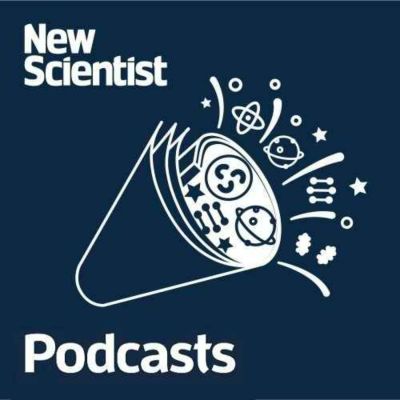Podcasts for the insatiably curious by the world’s most popular weekly science magazine. Everything from the latest science and technology news to the big-picture questions about life, the universe and what it means to be human.For more visit newscientist.com/podcasts Hosted on Acast. See acast.com/privacy for more information.
https://www.newscientist.com/
Gesamtlänge aller Episoden: 5 days 11 hours 4 minutes
Escape Pod: #6 All About Warmth: Emotional, Physiological and Geological
This is a re-airing of a podcast originally released in February 2021.
Keeping you cosy this week is an episode all about warmth - emotional, physiological and geological.
We have an unexpected start to the show, with bees taking the spotlight, but it turns out these cold-blooded little insects can generate immense warmth when necessary.
The team then takes a much bigger view of warmth, discussing the heat of the planet, and of the many uses of geothermal energy...
episode 239: Weekly: Is personalised medicine overhyped?; Pythagoras was wrong about music; How your brain sees nothing
#239
Two decades ago, following the Human Genome Project’s release of a first draft in 2001, genetic testing was set to revolutionise healthcare. “Personalised medicine” would give us better treatments for serious conditions, clear pictures of our risks and individualised healthcare recommendations. But despite all the genetic tests available, that healthcare revolution has not exactly come to fruition...
CultureLab: What would life on Mars be like? The science behind TV series For All Mankind
Freezing temperatures, dust storms, radiation, marsquakes – living on Mars right now would be hellish. And getting there remains a multi-year journey. But what if we could make it habitable? Could we one day build settlements on the Red Planet or send human scientists to search for life?
That’s the premise of the TV series For All Mankind, which explores a future where the space race continued after the moon landing and humanity kept spreading out across space...
episode 238: Weekly: ADHD helps foraging?; the rise of AI “deepfakes”; ignored ovary appendage
#238
ADHD is a condition that affects millions of people and is marked by impulsivity, restlessness and attention difficulties. But how did ADHD evolve in humans and why did it stick around? Through the help of a video game, a study shows that these traits might be beneficial when foraging for food.
In 2023, we hit record after record when it comes to high temperatures on Earth, including in the oceans and seas...
Esacpe Pod #5 Sound: Prepare to feel relaxed, tingly and amazed, in the space of 20 minutes
This is a re-airing of a podcast originally released in February 2021.
Prepare to feel relaxed, tingly and amazed all in the space of 20 minutes. This episode is all about sound.
We start with the musical tones of an elephant trumpeting, followed by a recording from Cornell University’s Elephant Listening Project, showing how they communicate at an infrasonic frequency, which humans can’t ordinarily detect...
episode 237: Weekly: Reversing blindness; power beamed from space; animal love languages
#237
Glaucoma, which can cause blindness by damaging the optic nerve, may be reversible. Researchers have managed to coax new optic nerve cells to grow in mice, partly restoring sight in some. How the treatment works through an eyeball injection and why, for humans, prevention and early detection are still the best options.
Black holes, just like planets and stars, spin. But they may be spinning a lot slower than we thought...
CultureLab: Where billionaires rule the apocalypse: Naomi Alderman’s ‘The Future’
Real tech billionaires are reportedly building secret bunkers in case of post-apocalyptic societal collapse. It’s a frightening prospect, a world where only the super rich survive catastrophe. But it’s a world one author is exploring in her latest novel.
Naomi Alderman is the prize-winning and best-selling author of The Power...
episode 236: Weekly: Record-breaking fusion experiments inch the world closer to new source of clean energy
#236
This week marks two major milestones in the world of fusion. In 2022 a fusion experiment at the Lawrence Livermore National Laboratory created more power than was required to sustain it – now, the same team has improved this record by 25 per cent, releasing almost twice the energy that was put in. Meanwhile, the UK’s JET reactor set a new world record for total energy output from any fusion reaction, just before it shut down for good late last year...
episode 4: Escape Pod: #4 Mass: from lightest creates on earth, to the heaviest things in the cosmos
This is a re-airing of a podcast originally released in February 2021.
From some of the lightest creatures on earth, to the heaviest things in the cosmos, this episode is all about mass.
It’s a magical opening to the show as the team discusses a group of insects called fairy wasps which are so light it’s near impossible to weigh them.
They then turn to matters of massive proportions, discussing a little thing called dark matter...
episode 235: Weekly: Alzheimer’s from contaminated injections; Musk's Neuralink begins human trials; longest living dogs
#235
In very rare cases, Alzheimer’s disease could be transmitted from person to person during medical procedures. This finding comes as five people have developed the disease after receiving contaminated human growth hormone injections in the late 1950s to early 1980s – a practice that is now banned. What this finding means for medical settings and why most people don’t need to be concerned...
